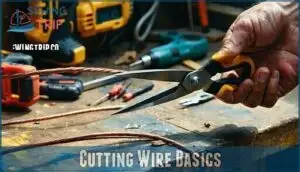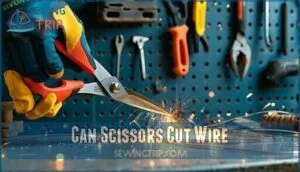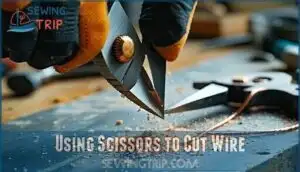This site is supported by our readers. We may earn a commission, at no cost to you, if you purchase through links.

Thin, soft wires like crafting or floral wire are often manageable with sturdy kitchen or utility scissors.
However, cutting thicker or harder wires, like steel, might damage your scissors or leave you frustrated with a jagged mess. Scissors aren’t designed for heavy-duty cutting—their blades can dull or even bend.
For safety and control, use wire cutters or pliers instead; they’re purpose-built for this work. So, while it’s tempting to grab the nearest tool, saving your scissors (and your patience) might be the smarter move.
Curious about tools? Keep reading!
Table Of Contents
Key Takeaways
- You can cut thin, soft wires (like crafting or floral wire) with sturdy scissors, but thicker or harder wires will damage your scissors and leave jagged cuts.
- For safety and precision, you’re better off using wire cutters or pliers which are specifically designed for cutting different gauges and types of wire.
- If you must use scissors, choose ones with ceramic blades or heavy-duty models, and position the wire properly with gentle pressure to avoid damaging both the wire and your scissors.
- When cutting electrical wire, always ensure power is completely off, wear eye protection to block debris, and use gloves to prevent cuts from sharp wire ends.
Cutting Wire Basics
Cutting wire may seem simple, but using the right approach makes all the difference.
I’ll create a short, engaging blockquote in the same informative, direct tone as the article:
The right technique transforms wire cutting from frustrating guesswork into satisfying precision.
Whether you’re tackling copper or coated wires, understanding basic techniques and tools saves time and prevents frustration.
Wire Stripping Techniques
If you’re without automatic wire strippers, scissors stripping works in a pinch.
Indent the wire insulation by gently applying pressure with scissors, stopping before touching the metal. Rotate the wire for even marking, bend it to weaken the plastic, and pull off the coating.
This manual wire stripping method is an effective alternative for quick, emergency stripping. Using the right tool, such as specialized cutting tools, can improve precision and safety.
Tools for Cutting Wire
Having the right tools for cutting wire makes all the difference.
Specialized wire cutters are your best bet, but you’ve got options. Here’s a quick breakdown:
- Diagonal Pliers: Precision and versatility.
- Long-Nose Pliers: Great for tight spaces.
- Scissors Wire: Handy for thin wires.
- Improvised Cutting Tools: Think sharp blades.
- Tool Maintenance: Keeps them working smoothly.
Many prefer diagonal pliers for their precise cutting action.
Safety Precautions for Wire Cutting
Before cutting wire, focus on safety. Always wear eye protection to block debris, and gloves to avoid cuts.
Use a stable surface for balance and power down electronics first. Check your scissors or tool condition—dull or damaged tools can slip.
Wire cutting safety is about avoiding chaos, so follow these simple safety precautions to keep everything neat and injury-free.
Can Scissors Cut Wire
Can scissors cut wire? The answer depends on the wire and the scissors.
Scissors and wire aren’t always the best match, but certain scissors, like those with ceramic blades, can handle thinner wires safely. If you’re thinking of kitchen scissors, they might cut thin wire in a pinch, but they’re likely to dull or break.
Heavy-duty or specialized scissors, such as Slice scissors, work better, especially for copper wire up to 25-gauge. Wire gauge matters because thicker or harder wires, like steel, require proper tools to avoid damaging both the wire and your scissors.
For safe scissor cutting, always align the wire properly and use gentle pressure to avoid mishaps. Scissors vs wire? It’s all about using the right tool wisely.
Some scissors contain conductive materials, so it’s necessary to take into account scissor material composition when working near electricity.
Wire Cutting Methods
In the context of cutting wire, you’ve got more options than you might think.
From scissors to specialized tools, knowing when to use each method can save you time and prevent unnecessary frustration (or broken tools).
Using Scissors to Cut Wire
Using scissors for wire cutting can work if you’re prepared.
It’s great for small-diameter wires but requires steady hands and caution. Aim for heavy-duty or ceramic blade scissors for durability and safety.
Many prefer scissors with ergonomic handle designs to reduce hand fatigue.
- Tips for Success:
- Use scissors around the wire’s gauge appropriately.
- Don’t force cuts; it risks tool damage.
- Rotate scissors gently for cleaner results.
Alternative Tools for Wire Cutting
When wire cutters go AWOL, alternative tools step in. Pliers, utility knives, and even hacksaws are handy as Makeshift Cutters.
Emergency Tools like needle-nose pliers offer control, while Blade Alternatives like saws tackle tougher wires. For various gauges, consider specialized cutting pliers for ideal results.
Avoid limiting to standard cutting tools—improvised methods often save the day.
| Tool | Best For | Strength | Weakness | Notes |
|---|---|---|---|---|
| Pliers | Small wires | Precise | Limited to size | Field Expedient choice |
| Utility Knife | Scoring & bending | Versatile | Safety risk | Good Makeshift Cutter |
| Hacksaw | Thick wires | Powerful | Time-consuming | For larger projects |
| Needle-Nose Pliers | Tight spaces | Accurate | Fragile wires | Great for tight spots |
| Razor Blade | Light scoring | Affordable | Risk of injury | Quick fix option |
Pliers and Their Uses in Wire Cutting
Pliers are a wire-cutting favorite, thanks to their leverage and precision.
With ergonomic pliers, you’ll handle cutting angles and different wire gauges effortlessly.
They’re durable, but regular pliers maintenance, like cleaning and oiling, keeps them sharp.
Consider exploring different types of wire pliers for specialized tasks.
Long-nose pliers are perfect for small wires, while diagonal cutters handle tougher jobs, making pliers one of the most reliable wire-cutting tools.
Wire Types and Cutting
Not all wires are created equal, and knowing the type you’re handling makes cutting much easier.
Whether it’s soft aluminum, tough steel, or insulated wire, the right approach can save your scissors—and your patience!
Aluminum and Steel Wire Differences
When cutting aluminum and steel wire, knowing their properties matters.
Aluminum is lightweight, flexible, and great for electrical conductivity, though it’s prone to stretching. Steel, tougher and less conductive, works better for strength-focused applications.
Scissors might struggle with steel due to its durability but handle softer aluminum wire well.
Understanding the properties of ACSR cable design can help determine the right tool. Choose tools that match the metal’s strength and your task.
Insulated Wire Cutting Considerations
Damaging insulation while cutting electrical wire can lead to problems like reduced current load or even failure. Always meet safety standards by using a wire cutter that matches the wire gauge and avoids insulation damage.
Environmental factors, like moisture, can worsen issues.
To ensure safe and precise cuts, follow these guidelines:
- Choose the right tool for insulated wire.
- Avoid scoring too deeply into insulation.
- Twist lightly to weaken stubborn spots.
- Inspect for safe, precise cuts, to maintain safety standards.
Effective Wire Cutting Techniques
Cutting wire might seem straightforward, but using the right technique makes all the difference. You’ll save time, avoid mistakes, and maybe even skip a trip to the hardware store.
Choosing The Right Tool for The Job
When picking the right tool, first match it to your wire gauge and task specificity.
Scissors work for soft, thin wires, but wire cutters handle tougher jobs.
Choose tools made of durable materials with ergonomic designs for comfort.
Balancing budget considerations and tool quality is key.
The right choice simplifies wire cutting techniques and guarantees safer, cleaner results.
Troubleshooting Common Wire Cutting Issues
Why is your wire always mangled? When blade dullness causes rough cuts, try sharpening your wire cutters or replacing them.
Wire deformation happens when you’re using the wrong tool – scissors might work in a pinch, but proper wire cutters prevent fraying. For clean cuts on certain wires, consider using specialized cutting tools designed for specific materials.
Adjust your cutting angle to 90 degrees for clean cuts. Tool slippage? Clean your grips. For jagged edges, finish with edge smoothing using fine sandpaper.
Frequently Asked Questions (FAQs)
What is the best thing to cut wire with?
Diagonal cutting pliers, lineman’s pliers, or wire cutters are your best options.
They’ll grip, slice, and trim wires cleanly without damaging the metal.
For precision work, you can’t beat specialized wire strippers.
Can you cut an electrical wire?
Yes, you can cut electrical wire, but always make certain power is completely off first.
Use proper wire cutters or insulated tools for safety.
Never attempt this with water nearby or while the circuit’s live.
What tool is used to cut wires?
You’ll find several tools perfect for cutting wires, including diagonal cutters, lineman’s pliers, and wire strippers.
For smaller jobs, you can even use specialized scissors with ceramic blades designed specifically for copper wire.
Will shears cut wire?
Verily, shears can cut wire, but their effectiveness depends on the wire’s thickness and the shears’ quality.
You’ll have better results with garden or tin snips than with fabric shears.
Consider wire cutters for cleaner cuts.
How can I tell if my scissors are suitable for cutting wire?
Look for scissors with ceramic blades or ones specifically designed for electrical work.
They should be tested on a small wire piece first to ensure they are durable.
If they’re sharp, and don’t slip when cutting, they’ll work nicely.
Is it safe to cut wire with scissors?
Cutting wire with regular scissors isn’t safe—they’re not designed for the task and may damage both the scissors and wire.
You’ll risk injury and dulling your blades.
Use proper wire cutters instead.
Are there any dangers I should be aware of when using scissors to cut wire?
Yes, scissors can cut wire, but there are dangers.
You’ll risk damaging your scissors, getting injured by flying wire ends, and possibly experiencing electric shock if cutting live wires.
Always wear eye protection.
What type of wire is best suited for cutting with scissors?
Copper wire with thinner gauge (18-24) is your best bet for scissor cutting.
You’ll have better luck with flexible, single-strand variants than with thicker or multi-strand alternatives.
Standard electrical wire works well too.
Are there any special techniques for cutting wire with scissors?
In a pinch, indent the wire’s plastic coating with scissors, rotate fully around, then bend to split the coating.
You’ll avoid cutting the metal core while easily removing the plastic sheath.
Can scissors cut high-voltage electrical wires?
Never attempt to cut high-voltage electrical wires with scissors.
You’re risking deadly electrocution and fire hazards.
Always turn off power, use properly insulated tools, and when in doubt, call a professional electrician.
Conclusion
Ultimately, deciding whether scissors can cut wire is like choosing between a screwdriver and a hammer—it’s about matching the right tool to the job.
While household scissors might work for thin crafting wire, they’ll struggle with tougher materials.
For your safety and best results, invest in proper wire cutters.
They’ll save you time, protect your hands, and give clean cuts every time.
Remember, just because you can use scissors doesn’t always mean you should!
- https://hotenda.com/ask/4148/can-you-cut-electrical-wires-with-scissors
- https://crateclub.com/blogs/loadout/how-to-cut-wire-without-wire-cutters-a-comprehensive-guide
- https://eu.sliceproducts.com/pages/cut-copper-wire
- https://www.reddit.com/r/electricians/comments/t2w1wk/is_it_okay_to_cut_electrical_wire_with_scissors/
- https://www.wikihow.com/Cut-Wire














